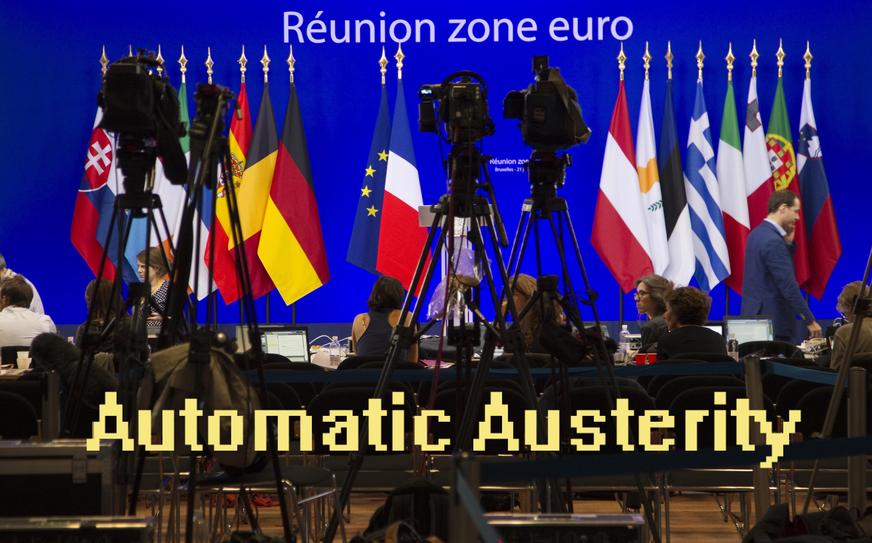RWE/CREA 7 mei over begrotingspact EU
Maandag 7 mei wordt het Real World Economics programma bij CREA in Amsterdam geheel besteed aan het ontrafelen van het nieuwe EU crisisbeleid, waarin de beruchte 3%-norm tot wet verheven wordt. (English version below)

Het EU-Begrotingsverdrag en de Formalisering van ‘Eeuwige Bezuinigingen’.
De economische crisis heeft een nieuwe draai gekregen toen de regeringsleiders in de EU het begrotingsverdrag tekenden op 2 maart. Wat de Duitse premier Angela Merkel triomfantelijk noemde een ‘mijlpaal in de geschiedenis van de Europese Unie’, zet Pandora’s doos open. Critici waarschuwen dat het nieuwe begrotingsverdrag een hevige aanval op de democratie behelst en zal leiden tot het verder verergere van recessie.
Landen die ondertekenen zullen zich vastleggen op vergaande en permanente fiscale discipline teneinde een beroep te mogen doen op het European Stability Mechanism (ESM), het noodhulpfonds dat de opvolger is van het tijdelijke European Financial Stability Facility (EFSF). Wie het afgesproken schuldenplafond passeert, zal boetes opgelegd krijgen door het Europees Gerechtshof. Dit maakt de weg vrij voor toenemende bezuinigingen op uitgaves voor sociale voorzieningen, privatiseringen en flexibilisering van arbeidsmarkten. De herverdeling van opbrengsten van arbeid naar kapitaal, die we de laatste drie decennia hebben zien plaatsvinden, zal verhevigd worden. Ondemocratische instellingen als de Europese Commissie en het Europees Gerechtshof krijgen souvereine rechten toegewezen en nieuwe volmachten, ondertussen zien nationale parlementen hun begrotingsmacht gereduceerd, en het Europees Parlement heeft niets te zeggen.
Om vanaf 2013 in werking te treden, moet het nieuwe verdrag geratificeerd worden door nationale parlementen, en in Ierland door een volksstemming. Debatten over de vergaand ondemocratische elementen en rampzalige sociaal-economische effecten, lijken echter afwezig. Deze avond van Real World Economics is gericht op het uitleggen van het begrotingsverdrag en diens gevolgen. Met Kenneth Haar (Corporate Europe Observatory), een expert op gebeid van het begrotingsverdrag; Andy Storey (University College Dublin), die zal ingaan op de socio-economische effecten en het Ierse referendum; Arjan Vliegenthart (Senator SP), die zal toelichten welke debatten er in het parlement plaatsvinden en Kees Hudig (Real World Economics), die informatie zal geven over komende acties zoals de blokkade van de ECB in Frankfurt van 17-19 mei. Gespreksleiding door Angela Wigger (Real World Economics). Voertaal: Engels
Datum: Maandag7 Mei 2012, 20.00 -22.00
Plek: CREA Café Amsterdam Nieuwe Achtergracht 170
Toegang: studenten gratis, anderen € 5,-; reserveren niet mogelijk.
meer informatie:
https://www.facebook.com/events/285130694896641/
http://www.tni.org/events/eu-fiscal-pact-and-constitutionalisation-austerity-forever
https://www.globalinfo.nl/tag/real-world-economics
—————
The EU Fiscal Pact and the Constitutionalisation of Austerity Forever
The economic crisis has reached a new momentum with the EU heads of government signing the Fiscal Pact on 2 March. What German Chancellor Angela Merkel triumphantly called a ‘milestone in the history of the European Union’ opens up Pandora’s box. Critics warn that the new Fiscal Pact constitutes a massive assault on democracy and leads to a further deepening recession.
Signatory states will have to commit themselves to harsh and permanent fiscal discipline in order to be eligible to the European Stability Mechanism (ESM), the rescue fund following up the interim European Financial Stability Facility (EFSF). Exceeding the agreed debt ceiling will be subject to fines by the European Court of Justice. This clears the road for ever more cuts in social welfare spending, privatisations and labour market flexibilisation, with further wage repression, mass lay offs, and lowered living standards as likely consequences. The redistribution of revenues from labour to capital, which has been observed in the last three decades, will be deepened. Undemocratic bodies such as the European Commission and the European Court of Justice are assigned sovereign rights and new competencies, while national parliaments find their own budgetary powers curtailed, and the European Parliament is left without a say.
In order to enter into force by 2013, the new Pact needs to be ratified by national parliaments, and Ireland by a popular referendum. Debates about the Pact’s profoundly undemocratic elements and its disastrous socio-economic impacts seem however largely absent thus far. This Real World Economics evening is devoted to explaining the Fiscal Pact and its consequences. With Kenneth Haar (Corporate Europe Observatory), who is an expert on the Fiscal Pact; Andy Storey (University College Dublin), who will cover its socio-economic impacts and the Irish referendum; Arjan Vliegenthart (Senator of the SP), who will brief the debates of the Dutch parliament; and Kees Hudig (Real World Economics), who will inform about upcoming actions such as the blockade of the ECB in Frankfurt on May 17-19. Moderated by Angela Wigger (Real World Economics).
Date: Monday 7 May 2012, 20.00 -22.00
Location: CREA Café Amsterdam Nieuwe Achtergracht 170
Admission: students free, others € 5,-; no reservations.
more information:
https://www.facebook.com/events/285130694896641/
http://www.tni.org/events/eu-fiscal-pact-and-constitutionalisation-austerity-forever
https://www.globalinfo.nl/tag/real-world-economics